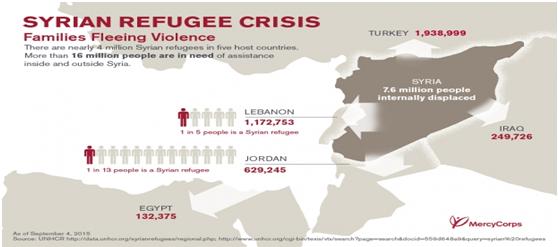Widgetized Section
Go to Admin » Appearance » Widgets » and move Gabfire Widget: Social into that MastheadOverlay zone
The Syrian Refugee Crisis: A Perspective from Jordan
The views expressed are those of the author and do not necessarily reflect the views of ASPA as an organization.
By Blake Evermon
October 6, 2015
The Syrian refugee crisis is nothing short of a growing humanitarian emergency in the Middle East, and its impact on Jordan has been especially difficult. It estimated that 9 million people have fled Syria since March 2011 and that another 6 million are displaced within Syria. European states have recently pledged to accept over a million Syrian refugees in the coming year, with Germany alone pledging to receive 800,000.
But what is often asked by my peers and colleagues is why the Muslim-Arab world not doing more to mitigate this crisis. The following graphic from Mercy Corps illustrates the regional commitment to assist the displaced Syrians.

Many Middle Eastern countries face challenges when dealing with mass migration and Jordan is no exception. Despite being a relatively poor country, Jordan is charged with the formidable burden of accommodating a large numbers of refugees—nearly half of the national population. Jordan’s economy is among the smallest in the Middle East and it faces high unemployment, poverty, large budget deficits and heavy reliance on foreign aid. The country’s national infrastructure and social service programs face tremendous strain that is heightened by the Palestinian, Syrian and Iraqi refugee crises.
The United Nations Relief and Works Agency (UNRWA) and the United Nations High Commissioner for Refugees (UNHCR) were formed to mitigate these crises. The UNRWA and the UNHCR estimate that over the last 60 years 2.7 million Palestinian and Iraqi refugees have arrived in Jordan to await repatriation and resettlement in their home countries. There are currently 10 UNRWA camps and 16 UNHCR camps located in Jordan that house approximately 1 million documented refugees—many others have no documentation at all. Jordan is home to the largest Palestinian refugee population and the second largest Iraqi refugee population in the world.
Jordan has accepted approximately 650,000 Syrian refugees to date, with more on the way. U.S. Ambassador David Lange writes in DipNote, “This is [the total refugee population in Jordan] equivalent to 27 million people entering the United States, more than the population of Texas.”
Jordan is not a signatory to the 1951 United Nations Refugee Convention, which means that Jordan is under no international obligation to house, shelter or assist refugees or asylum seekers. Jordan’s long history of assisting Arab refugees has earned it the reputation of a haven where refugees are regarded as “Arab brothers and sisters” in need. Jordan, and its partners, currently provides limited health care, education, shelter, subsidized transportation and employment opportunities to all refugees.
The large funding gap in Jordan and the UNHCR means that the resources and infrastructure are not sufficient to support the current Syrian populations much less the migration increase that is expected in the coming years. In June 2015, the Regional Refugee & Resilience Plan in Response to the Syria Crisis (a report jointly released by 200 partners) stated that only 23 percent of the $4.3 billion USD required to help mitigate the crisis has been received. Therefore, it is uncertain when the refugees will wear out their welcome.
A 2014 Konrad Adenauer-Stiftung cost-benefit analysis estimated that Syrian refugees have cost Jordan up to $5.1 billion dinars ($7.2 billion USD) from 2012–2014. Syrian refugees compete for jobs, tax civil infrastructure, strain social welfare programs, drive down local wages and raise rent rates in large cities. Many are also turning to negative coping mechanisms such as drugs, prostitution, child trafficking and crime to make ends meet.
Jordan is working hard to mitigate the current refugee crisis, but more help is desperately needed. If the war stopped today and there was peace in Syria, it would still take years and an international coalition to reconstruct Syria. In the short term, this is a race to help individuals and families where the losers die or suffer irreparably.
Author: Blake Evermon is a doctoral candidate in public administration at the University of Illinois, Springfield, and his research interests include refugee assimilation, the Arab-Israeli conflict, Islamic radicalization, emergency management and terrorism. Evermon has completed graduate work and language training in Jordan, and field research in Israel and the Palestinian West Bank. His professional experience includes analysis for the U.S. government and information/cyber security for educational institutions. He can be reached at [email protected].



 (3 votes, average: 3.67 out of 5)
(3 votes, average: 3.67 out of 5)
Pingback: Global Breezes – November 2016 - Good Governance Worldwide